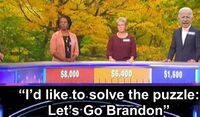Wheel of Fortune
Wheel of Fortune is an American television game show created by Merv Griffin. It was originally hosted by Chuck Woolery when it debuted on NBC on January 6, 1975, but is currently hosted in first-run syndication by long-running Pat Sajak (who debuted as host on the NBC version in 1981 and has hosted the syndicated version since its debut on September 19, 1983). Vanna White shows the letters on the puzzle board. The show is based on the children's game Hangman. In syndication, it is paired with Jeopardy! (the syndicated version of which has aired since 1984); both shows are produced by Sony Pictures Television (the successor-in-interest to original production company Merv Griffin Enterprises) and distributed by CBS Television Distribution (which took over those duties after absorbing original distributor King World in 2007).
Gameplay
Three players are given puzzles over several rounds which consists of a phrase, proper name, or other such categories. Contestants spin a wheel in which they will either land on an a money amount, a Bankrupt wedge, a Lose a Turn wedge, prize card, or additions added for special episodes such as a Million Dollar wedge. If a player lands on a money amount, they guess a consonant that will appear in the puzzle. If correct, they will add that amount times the number of times that letter appears to their bank. The player gets another turn. If they guess incorrectly, they end their turn, and play goes to the next player. If they are bankrupted, they lose their money (money won from previous rounds is unaffected) and their cardboard items (the Wild Card, the Million Dollar wedge, prize wedges, and 1/2 Car plates), and play passes over. Vowels are bought for $250, no matter how many of those vowels appear. The player who solves the puzzle wins their money banked for that round (but for not less than the house minimum of $1,000). The player who wins the most over all rounds wins the game and gets to play the bonus round for up to $100,000 (or $1,000,000 if the Million Dollar wedge is brought to the bonus round) where a prize is spun on a mini wheel and get a puzzle where ten letters are supplied: the letters R, S, T, L, N, and E are automatic, and four letters are picked by the player (three consonants and a vowel) after those are revealed (a bonus wild card, if won by the player, allows for one additional letter). (Originally the player picked six letters, the ones shown above were nearly always the ones chosen, and therefore the format was changed.)
In the case a contestant reaches the end of the game with a score of zero, they win $1,000 instead of walking out empty-handed.
Other elements
- Toss-Ups: One letter is revealed at a time. Once someone buzzes in, they have one attempt to solve the puzzle, and failure prevents them from winning the money.
- Million Dollar wedge: Enables an opportunity to win one million dollars at the Bonus Round. The contestant must solve the puzzle at the same round the wedge was obtained to keep it.
- Wild Card: Allows calling for another consonant for extra money. Highly recommended to use when a contestant lands on top dollar amount for the potential to win even more money.
- Mystery Wedge: Can contain $10,000 or a Bankrupt on the other face of the wedge. The contestant calls a consonant, and if there is at least one of the consonant he or she called, he or she can take the buyout offer equal to $1,000 times the number of the consonant revealed, or gamble their money by flipping the Mystery Wedge over. The $10,000 cannot be used for buying vowels, and it will be lost to a bankrupt. The contestant must then solve the puzzle with the wedge to win $10,000.
- Express Wedge: First, the contestant calls a consonant worth $1,000 apiece. If successful, the contestant can choose whether or not to hop aboard the Express and keep calling consonants worth $1,000 each. Vowels can be bought for $250. If the contestant's turn ends and has not yet solved the puzzle, they get bankrupted and kicked out of the Express.
- 1/2 Car plates: Getting two of these plates wins the contestant a new car. The contestant must solve the puzzle on the same round the plate(s) was or were obtained to keep it/them.
Video games
Several video games on consoles, PC, and online have been developed based on the show, by such developers as Rare, GameTek, and THQ.
